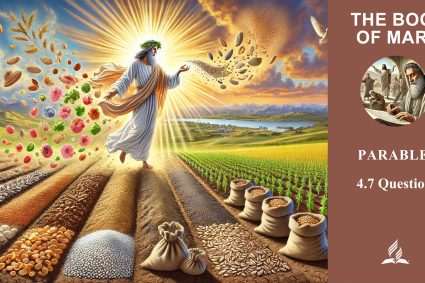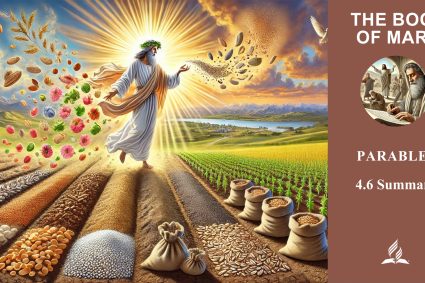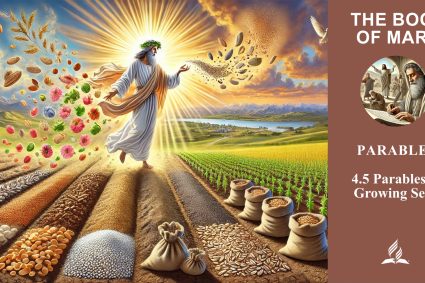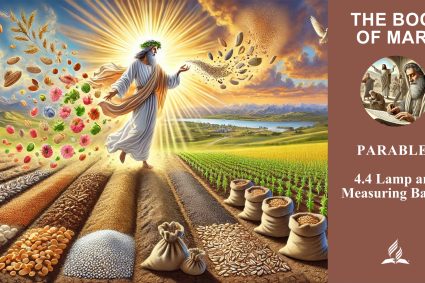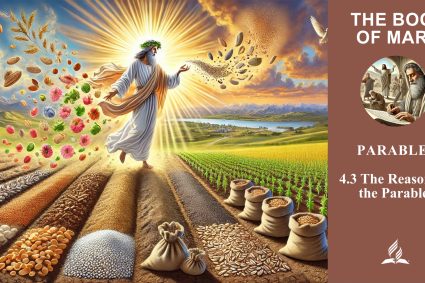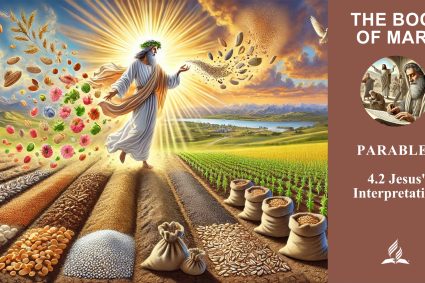

3.6 Summary
In Lesson 3, the significance of God’s creation, sovereignty, and rule was explored in various Psalms. The Psalms emphasize God’s supremacy as the Creator of the universe, His sovereignty over all natural forces, and His rule over the entire creation. Creation is portrayed as a witness to God’s greatness and glory.
Furthermore, the expression of God’s love in creation and specifically in His relationship with His people was highlighted. The Psalms call for recognizing God as the only worthy object of worship, possessing all power and dignity. The Psalms also underscore the role of God’s laws and testimonies as reliable guidelines for a just and fulfilled life. God’s faithfulness to His people, as depicted in His eternal covenant with Israel, is emphasized, highlighting that God’s laws are firm, reliable, and unchanging.
Finally, the Psalms emphasized the significance of God’s rule over the entire world and His role as a judge. God’s judgment is portrayed as an instrument of education and restoration, and the righteous are encouraged to rejoice in anticipation of divine judgment.
In summary, Lesson 3 clarifies the central theological themes in the Psalms, including creation, sovereignty, God’s love, faithfulness to His people, the role of laws, and the impending divine judgment.
Comfort and Hope: Psalms as Companions in Daily Life
The connection of Lesson 3 to our daily lives and faith lies in the practical application of the theological principles discussed in the Psalms. Here are some key aspects of this connection:
-
Worship and Devotion: Lesson 3 emphasizes the importance of worshiping God as the Creator, Ruler, and Judge. In daily life, this means giving God the proper place in our lives. We can use our time, talents, and resources to honor and worship God.
-
Responsibility for Creation: Belief in God as Creator calls us to be responsible for the environment and creation. This can manifest in our decisions and lifestyles aimed at preserving and living sustainably.
-
Faith in Times of Challenge: Lesson 3 touches on the themes of God’s sovereignty and His coming judgment. In daily life, this means aligning our faith with God’s guidance and promises in times of challenge. We can find trust and hope amid difficulties, knowing that God is sovereign.
-
Repentance, Conversion, and Sanctification: Awareness of God’s judgment calls us to repentance, conversion, and sanctification. In everyday life, this means actively resisting sin, repenting, and striving for a life of holiness to live in accordance with God’s will.
-
Community and Justice: Belief in God’s sovereign rule challenges us to promote justice and community. In our daily lives, we can advocate for justice, care for the needs of others, and actively contribute to community improvement.
The connection of Lesson 3 to our daily lives and faith involves translating the theological principles of the Psalms into concrete actions and attitudes. It calls us to put our faith into practice, maintain a vibrant relationship with God, and embody the principles of His kingdom in our daily lives.
Discussion Questions:
1,Why is understanding the reality and prevalence of the Great Controversy crucial to comprehending that, despite God’s ultimate rule and sovereignty, there is still turmoil and suffering in our world? How is the concept of the Great Controversy very helpful for us?
Understanding the Great Controversy is crucial to grasp the ongoing presence of turmoil and suffering in the world despite God’s ultimate rule and sovereignty. Here are some reasons why the concept of the Great Controversy is helpful:
-
Reality of Evil: The concept recognizes the reality of evil actively working in the world. It explains that behind the turmoil and suffering lies a spiritual conflict between good and evil.
-
Free Will: The Great Controversy concept respects the free will given to creatures. Despite God’s sovereignty, He has granted free will, and the existence of evil is partly a result of creatures’ choices.
-
Divine Justice: It emphasizes divine justice and the necessity of a final judgment. God’s sovereign rule will ultimately lead to a complete victory over evil.
-
Explanation for Suffering: The concept provides an explanation for suffering due to sin and rebellion in the world. It shows that suffering is not the final word, and God will ultimately overcome evil.
-
Encouragement for Resistance: Understanding the Great Controversy encourages active resistance against evil. It reminds us that we can play a role in this spiritual conflict by standing for what is good and faithfully serving God.
Overall, the concept of the Great Controversy helps us understand the complex reality of good and evil, freedom, and divine sovereignty in a fallen world. It instills hope that God’s final rule will triumph over evil and encourages us to stand on God’s side amid challenges.
2.How should the belief in God as Creator shape our understanding of ourselves and our relationship with the rest of creation? What happens when people deviate from this truth (Psalm 106:35–42)?
The belief in God as Creator profoundly shapes our understanding of ourselves and our relationship with creation:
-
Identity as Creatures: Belief in the Creator reminds us that we are creatures of God. Our identity is rooted in the idea that we are formed by God and created in His image, giving our lives deep meaning and purpose.
-
Responsibility for Creation: As creatures of God, we have the responsibility to care for and preserve the environment. Belief in the Creator brings an ethical dimension, urging us to be good stewards of the resources and environment entrusted to us.
-
Communion with Creation: The belief in the Creator opens the possibility of a deep connection to nature and other creatures. It fosters an awareness of the beauty and value of the entire creation, encouraging respectful interaction.
When people deviate from this truth, as indicated in Psalm 106:35–42, various negative consequences may occur:
-
Rejection of the Creator’s Order: Deviation from the truth of God as the Creator can lead to a rejection of His order. People may ignore their responsibility for creation and act recklessly.
-
Idolatry and Turning Away from God: As mentioned in the Psalm, turning away from the truth about the Creator can lead to idolatry and spiritual turning away from God. People might turn to other gods and neglect their fundamental relationship with their Creator.
-
Injustice and Suffering: The Psalm suggests that turning away from God can lead to injustice and suffering. A life out of harmony with the divine Creator’s order could result in disharmonious relationships, social issues, and personal suffering.
Overall, belief in God as Creator emphasizes the importance of a harmonious relationship between humans and creation. Deviating from this truth can lead to estrangement from God and negative consequences in our relationship with creation.
3.What was wrong with the idols of the nations in biblical times (Psalm 115:4–8)? What about modern idols? Why are they equally dangerous for our life with the Lord?
Psalm 115:4–8 highlights the futility and danger of idol worship among the nations in biblical times. Some aspects addressed in the text include:
-
Lifelessness of Idols: Idols are described as lifeless and powerless. They have mouths, eyes, ears, hands, and feet but cannot speak, see, hear, act, or walk. This underscores the senselessness of worshiping such idols.
-
Dependence on Humans: Idols are man-made, and their existence depends on human actions and decisions. In contrast, the Psalm emphasizes the sovereignty and independence of the living God.
-
Lack of Power and Effectiveness: Idols lack the power to protect or bless those who worship them. The Psalm suggests that those who trust in them will ultimately be disappointed.
Modern idols can take various forms, but they retain the fundamental characteristics described in Psalm 115:
-
Dependence on Human Creation: Modern idols might include material possessions, technological achievements, social recognition, or personal success. These things are often human-made and depend on human actions.
-
Lifelessness: In a metaphorical sense, modern idols could be things that lack real vitality or spiritual significance. When people consider such things as the ultimate goal of their lives, they lack the spiritual vitality found only in a relationship with God.
-
Lack of Effectiveness: Like the idols in Psalm 115, modern idols cannot provide true power or help. When people seek their identity, security, or fulfillment in such idols, they will ultimately be disappointed.
Modern idols are equally dangerous for our life with the Lord as those in biblical times. They can distract us from true worship of God, distort our priorities, and alienate us from an authentic relationship with God. Therefore, it is crucial to examine our hearts to determine where we place our devotion and trust.
4.How should the people of God live, knowing that God’s judgment begins with His people? How does God judge His people, and for what purpose?
Given the biblical teaching that God’s judgment begins with His people, the people of God should live in various ways:
-
Godly Living: The people of God should live in reverence and obedience to God. This means observing His commandments, studying His word, and striving to lead lives that align with God’s will.
-
Repentance and Turning Back: In light of the impending judgment, repentance and turning back to God are crucial. The people should be willing to turn away from sins, turn to God, and pursue sanctification. Repentance is key to preparing for God’s judgment.
-
Justice and Mercy: The people of God should advocate for justice and mercy. Striving for a just and merciful society is an expression of worship and aligns with the principles of God’s kingdom.
-
Trust in God’s Guidance: In the face of challenges and uncertainties, the people of God should trust in God’s guidance. Living a life of faith, relying on God’s sovereignty, and understanding that everything is in His hands are responses to the impending reality of divine judgment.
God judges His people in various ways and at different times:
-
Education and Correction: God’s judgment serves as education and correction. It aims to correct the people when they deviate from God’s path and guide them back onto the right course.
-
Revelation of Sins: God’s judgment can reveal and expose sins within the community. This allows individuals to recognize their mistakes, repent, and turn away from their sinful ways.
-
Testing of Faith: God’s judgment can test the faith of His people. In challenging times and trials, it becomes evident whether the people will continue to trust in God and remain steadfast.
The purpose of God’s judgment is to sanctify His people, draw them closer to Himself, and prepare them for the fulfillment of God’s kingdom. It is an act of love and care, aiming to foster a deep and obedient relationship between God and His people.
Visited 2 times, 1 visit(s) today

